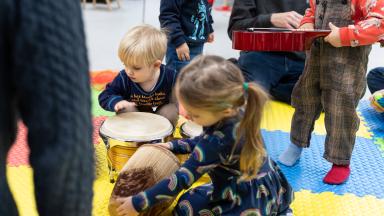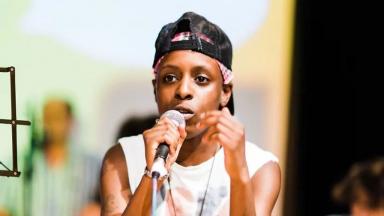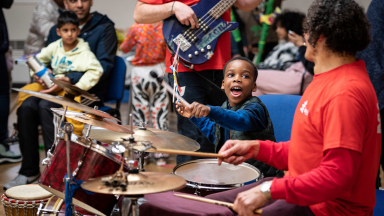The funding sector is facing a growing crisis.
With funding success rates at just 17%, making the ‘right’ decisions about grant awards is a real concern. With demand and quality of applications so high, choosing one application in favour of another could become an arbitrary decision.
The way funders can overcome this is to ensure that the processes behind the decisions are robust, equitable and participatory.
“Youth Music place their trust in our judgment and opinions, giving us the freedom to tap into our experience and expertise” - Youth Music Advisor
Improving participation has been a major focus of the work of our Grants and Learning Team in recent years. In fact, one of our funding principles is to ‘Be participatory’.
What is participatory grantmaking?
Think of it like this: ‘nothing about us without us’. It’s a term made famous by the disability rights movement that says that no policy should be decided without the full participation of the group(s) affected. This form of grant-making shifts the power about funding criteria and decisions to the communities the funder aims to serve. It’s a growing trend amongst funders, and part of a global community of practice.
This is a vital way of working for any progressive grant-maker. It democratises funding, promotes social justice and equity, keeps us relevant, and builds greater trust with our partners. We’ve been doing it in a meaningful way since 2020 and found that it’s a win-win. The people involved get as much out of it as we do.
“Being a Youth Music Advisor has been such an interesting and rewarding experience. Through this role, I’ve been able to learn so much more about the different music organisations around the country, the complexities and criteria around decision-making processes for project funding, and have met some really nice and supportive people and colleagues” - Youth Music Advisor
What do we mean by ‘lived experience’?
The people we involve are those who have experience of applying for, delivering, or participating in work like Youth Music funds. They have first-hand experience of barriers to making, learning or earning in music. We work with both young people, and the projects and professionals delivering youth music programmes.
Lived experience in decision making
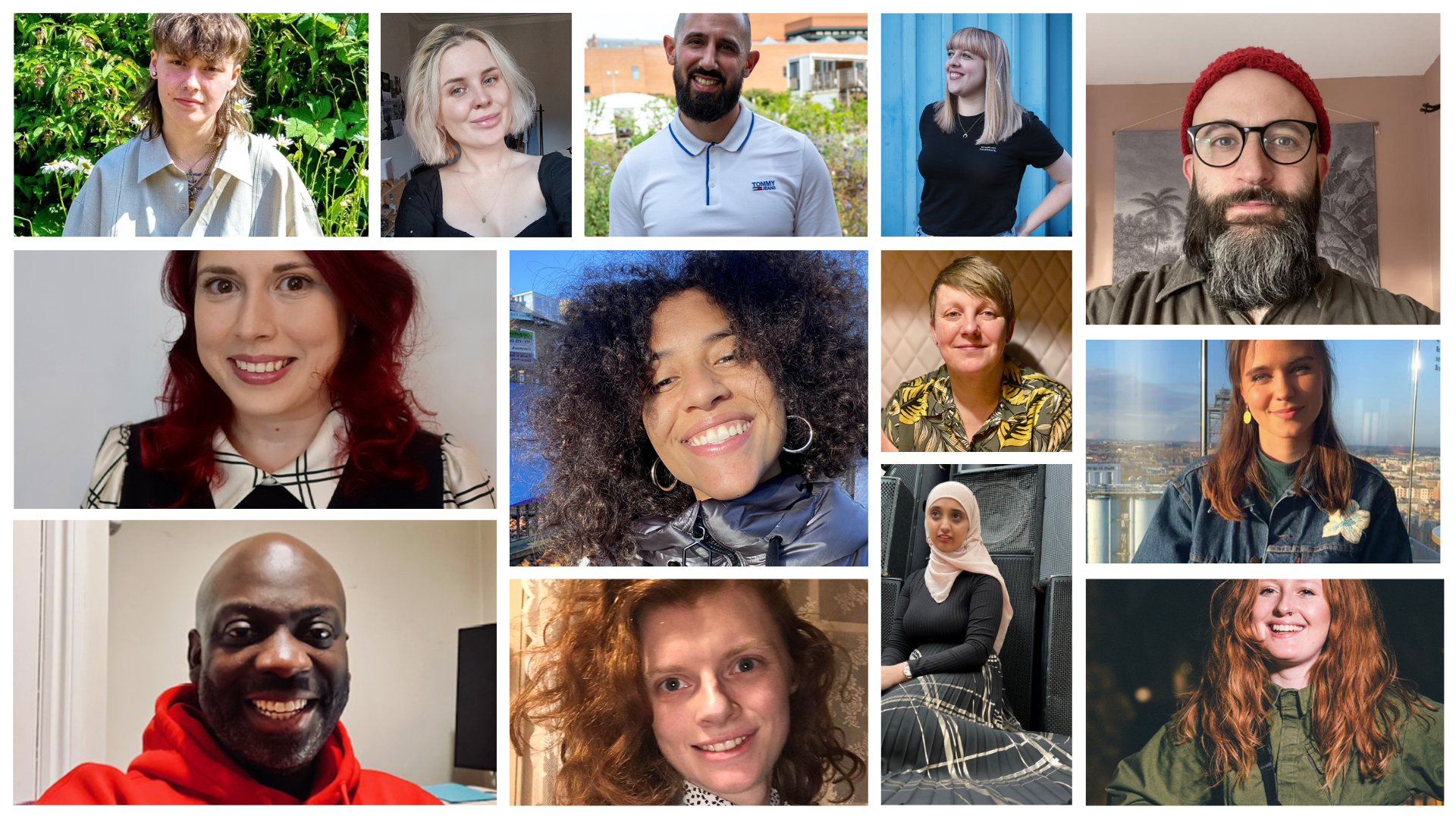
We continue to diversify our staff and freelance teams. Recently, we contracted an inspirational group of 26 funding advisors, from all parts of the UK. We believe that a greater diversity of views, skills and lived experience leads to better decisions, and so we involve multiple people at every stage. Our advisors help shape our choices, by assessing applications and sitting on our funding panels.
How we involve young people
You may have seen the big emphasis on youth voice and co-design in our funding criteria. When we developed the Trailblazer and Catalyser Funds, we held creative consultation workshops with young people. We heard loudly and clearly that youth voice needed to be prioritised throughout application and decision-making. Both in the organisations applying for funding, and within Youth Music itself.
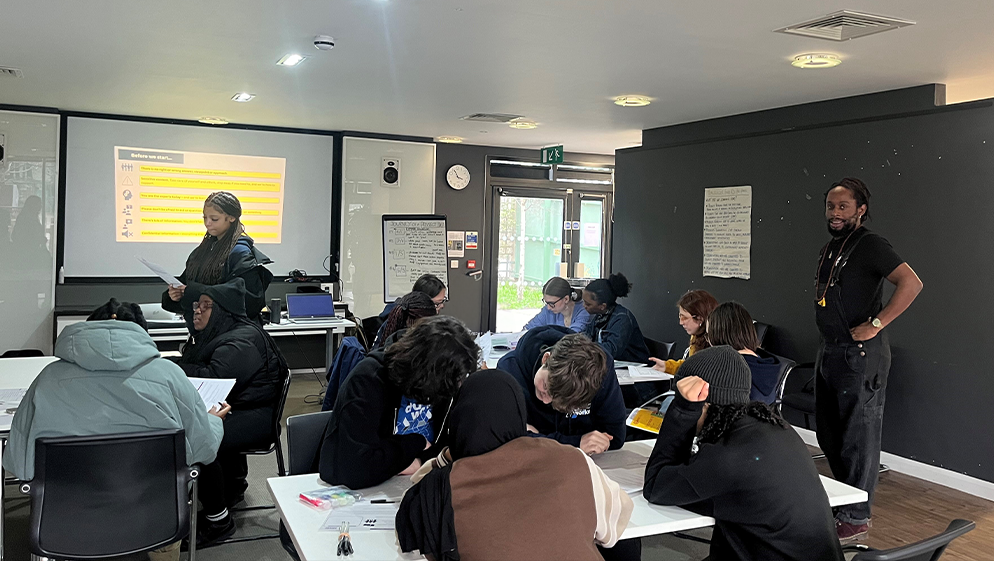
Across a day-long workshop with Drum Works, young people showed us how to make some of their beats and reviewed 33 applications. Next, some of the group will attend a shortlisting panel with Youth Music staff and our external advisors to agree final funding recommendations. About the session, young people said:
“A nice insight into how projects get funded”.
“A useful introduction into organisations I had never heard of”.
“Great way of getting youth voices involved in helping the process of funding music projects”.
How participation has influenced the design of our funding programmes
When we think about shifting power, we often focus on decision-making. However, the process starts long before that, from the outset of fund design. It’s vital to involve people in these early stages because it influences who can apply, and what the priorities are. Perhaps you’ve attended one of our recent consultations to inform our next programme to close the gap from music learning to music earning.
Ongoing consultation is important too. Our annual feedback survey helps us see what challenges our partners are facing. Core funding has been a big theme in recent years. As a result, we changed our criteria and messaging to encourage people to recoup the real value of core costs.
Challenges and considerations
Involving people does take more time and resource. Whilst we believe this results in better outcomes, it does mean that we’ve had to adjust our budgets. More importantly, it means we can’t shorten the application process as many would like. Time is required to build trust, and to make the process engaging and accessible - especially when working with groups of young people. We’ve been helped in this by some of our fantastic funded partners. Later this year, will be announcing three new youth voice partners with whom we’ll work over the next year.
We’re also challenged when it comes to equity. Historically, a lot of our youth voice work has been done with 18-25 year olds. Finding meaningful ways to engage younger age groups, and those facing bigger barriers, are things we’re working to address.
Our experiences of participatory grantmaking have been fun, inspiring, and informative. We’ve made progress, but we’re not where we want to be. If our first three years have been about testing, trialling and embedding – the next four will be about scaling up, being more radical, and more equitable. We look forward to sharing our journey with you.
Read next...
IDEA hub
We believe that music should be Inclusive, Diverse, Equitable, and Accessible. We call these principles 'IDEA' for short. Want to improve inclusion, diversity, equity and access in your organisation? Check out our self assessment survey to help you think through what you’re doing well, and what could be improved. We've also compiled additional resources to inspire and shape your IDEA journey.
Youth Voice hub
Find out what Youth Voice is, why it's important, and resources on how to do it.
Reflecting on 25 Years of Youth Music
Youth Music CEO, Matt Griffiths, reflects on Youth Music's journey as we celebrate our 25th anniversary.

